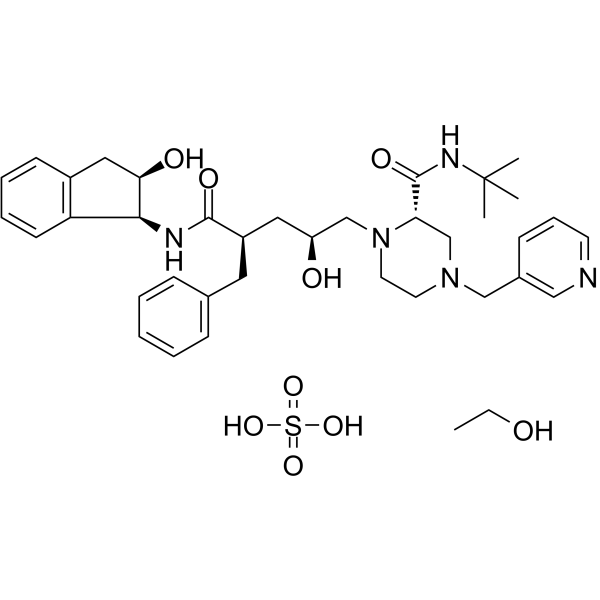茚地那韦硫酸乙醇酸盐
更新时间:2024-01-12 23:55:56

茚地那韦硫酸乙醇酸盐结构式

|
常用名 | 茚地那韦硫酸乙醇酸盐 | 英文名 | Indinavir sulfate ethanolate |
|---|---|---|---|---|
| CAS号 | 2563866-80-6 | 分子量 | 757.94 | |
| 密度 | N/A | 沸点 | N/A | |
| 分子式 | C38H55N5O9S | 熔点 | N/A | |
| MSDS | N/A | 闪点 | N/A |
茚地那韦硫酸乙醇酸盐用途靛地那韦硫酸乙醇酸酯(MK-639乙醇酸酯)是一种口服活性和选择性的HIV-1蛋白酶抑制剂,对PR的Ki为0.54nM。靛地那韦硫酸乙醇酯通过抑制MMP-2水解的激活、抗血管生成和诱导凋亡而显示抗癌活性。靛地那韦硫酸乙酯也是SARS冠状病毒3CLpro抑制剂[1][2][3][4]。 |
| 中文名 | 茚地那韦硫酸乙醇酸盐 |
|---|---|
| 英文名 | Indinavir sulfate ethanolate |
| 描述 | 靛地那韦硫酸乙醇酸酯(MK-639乙醇酸酯)是一种口服活性和选择性的HIV-1蛋白酶抑制剂,对PR的Ki为0.54nM。靛地那韦硫酸乙醇酯通过抑制MMP-2水解的激活、抗血管生成和诱导凋亡而显示抗癌活性。靛地那韦硫酸乙酯也是SARS冠状病毒3CLpro抑制剂[1][2][3][4]。 |
|---|---|
| 相关类别 | |
| 靶点 |
HIV-1 MMP-2 |
| 体外研究 | 硫酸乙醇靛地那韦(0-50µM;18小时)阻断PBMCs细胞G0/G1期的淋巴细胞周期,并损害淋巴细胞增殖反应[1]。硫酸乙醇靛地那韦(40µM-40 nM;5天)在体外抑制Huh7和SK-HEP-1肝癌细胞的细胞侵袭和(40µM-40 nM;48小时)MMPs-2活化[2]。细胞活力测定[1]细胞系:PBMCs(来自健康和HIV感染的志愿者)浓度:0-50µM孵育时间:18小时(预处理;用抗CD3刺激48小时)结果:以剂量依赖性方式阻断抗CD3诱导的细胞周期进展。导致淋巴细胞增殖反应的剂量依赖性减少。细胞侵袭试验[2]细胞系:Huh7和SK-HEP-1细胞浓度:40µM-40 nM孵育时间:5天结果:与未处理细胞相比,两种处理细胞系侵袭体外构成的细胞外基质的能力降低。Western印迹分析[2]细胞系:Huh7和SK-HEP-1细胞浓度:40µM-40 nM孵育时间:48 h结果:阻断潜在MMP-2向其62/64 kDa活性形式的转化。 |
| 体内研究 | 乙醇硫酸靛地那韦(70 mg/kg;例如,每天一次,持续3周)抑制体内肝癌细胞的生长[2]。动物模型:裸鼠(皮下注射入Huh7和SK-HEP-1细胞)[2]。剂量:70mg/kg给药:口服灌胃;结果:与安慰剂相比,裸鼠皮下移植的肝癌异种移植物的生长速度减慢。 |
| 参考文献 |
| 分子式 | C38H55N5O9S |
|---|---|
| 分子量 | 757.94 |

